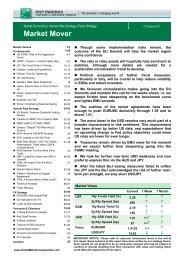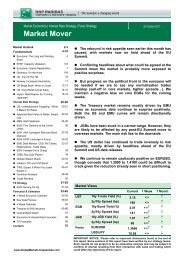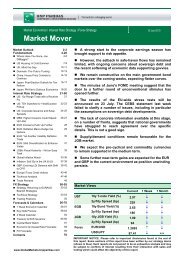MARKET MOVER - BNP PARIBAS - Investment Services India
MARKET MOVER - BNP PARIBAS - Investment Services India
MARKET MOVER - BNP PARIBAS - Investment Services India
You also want an ePaper? Increase the reach of your titles
YUMPU automatically turns print PDFs into web optimized ePapers that Google loves.
eta, yield and commodity currencies will remain firm<br />
this year, the outlook for 2011 is less upbeat.<br />
Successful intervention?<br />
The BoJ intervening on behalf of the MOF has<br />
stabilised JPY markets. But further intervention will<br />
be needed to prevent the JPY from appreciating<br />
again. An analysis of JPY-related flows demonstrates<br />
this. While Japanese institutional investors have<br />
invested heavily in foreign bond markets, betting on<br />
the ‘Japanisation’ of Western economies, these JPY<br />
outflows have all been currency hedged.<br />
Consequently, portfolio flows have been currency<br />
neutral. Since M&A related flows have been<br />
insignificant, we believe that most of the JPY<br />
strength has been caused by commercially related<br />
JPY demand. Japanese exports have been JPY<br />
bidding and, if the semi-official Japanese Postbank<br />
had not quietly offered JPY, the USDJPY decline<br />
seen since March would have been even more<br />
dramatic. Currently, commercial JPY flows are<br />
dominant and intervention will not change Japanese<br />
exporters’ need to buy JPY. Hence, the BoJ will have<br />
to intervene in the amount roughly matching the size<br />
of Japan’s current account surplus. Given that<br />
Japan’s reserve to GDP ratio has over the past six<br />
years risen from 16% to 21%, the BoJ has ample<br />
scope to conduct JPY weakening intervention to<br />
keep USDJPY above 80.00. The coming quarter<br />
should see USDJPY slowly grinding lower, but with<br />
the BoJ in the market, the risk of a sharp move lower<br />
may have been prevented.<br />
ECB repo allocation…<br />
Hence, JPY markets should not dent risk appetite,<br />
allowing us to shift focus to the EUR. EMU<br />
economies show a split performance: Germany is<br />
surprising with its strength, while Spain and other<br />
peripheral economies face a double-dip recession.<br />
However, the market has always believed that<br />
Germany is the trend setter for the eurozone and it<br />
will continue doing so until proven wrong. Indeed,<br />
German export-oriented growth has received a big<br />
boost from booming Asian and Middle Eastern<br />
markets. With Chinese economic statistics showing<br />
domestic demand rising strongly and China allowing<br />
its currency to appreciate at a moderate pace,<br />
exporter optimism in coming surveys could be<br />
buoyed even further. Meanwhile, outstanding ECB<br />
reserves have decreased from EUR 900bn to EUR<br />
600bn, indicating that Europe’s banking sector<br />
overall has become less dependent on ECB liquidity.<br />
Nonetheless, this is the extent of the good news. The<br />
ECB has allocated unlimited repo liquidity at the fixed<br />
1% rate. Some 61% of reserves provided by the ECB<br />
have been absorbed by peripheral banks located in<br />
Spain, Portugal, Greece and Ireland. As long as the<br />
ECB provides unlimited access to central bank<br />
Chart 4: Japan: Current Account Surplus Drives<br />
USDJPY<br />
Source: Reuters EcoWin Pro; Current account (12mths sum) (USD), (Bln)<br />
Chart 5: Excess of Reserves Held by European<br />
Commercial Banks with the ECB Reduced<br />
Source: Reuters EcoWin Pro<br />
liquidity, the solvency of peripheral banks is almost<br />
guaranteed. Peripheral banks can even get access to<br />
short-term private funds. However, once the ECB<br />
begins to exit from the unlimited provision of liquidity,<br />
the outlook will change radically. In this case,<br />
peripheral banks will run short of funds, forcing<br />
sovereigns to step in. The creditworthiness of<br />
peripheral sovereigns has been damaged and, with<br />
bond spreads wide, it is not clear that sovereigns’<br />
fund-raising capabilities are sound enough to deal<br />
with additional liquidity demands from its banking<br />
sector.<br />
…will be important for assessing investment<br />
risks<br />
Indeed, the weak banking sector could easily<br />
undermine EMU credit markets. The successful<br />
Spanish sovereign auctions saw little international<br />
participation, with domestic banks the main investors.<br />
Should the ECB cut banks off from unlimited liquidity,<br />
demand for local bonds will suffer – driving spreads<br />
up. Remember, in November 2009, the ECB’s<br />
Hans Redeker 23 September 2010<br />
Market Mover, Non-Objective Research Section<br />
46<br />
www.GlobalMarkets.bnpparibas.com
















